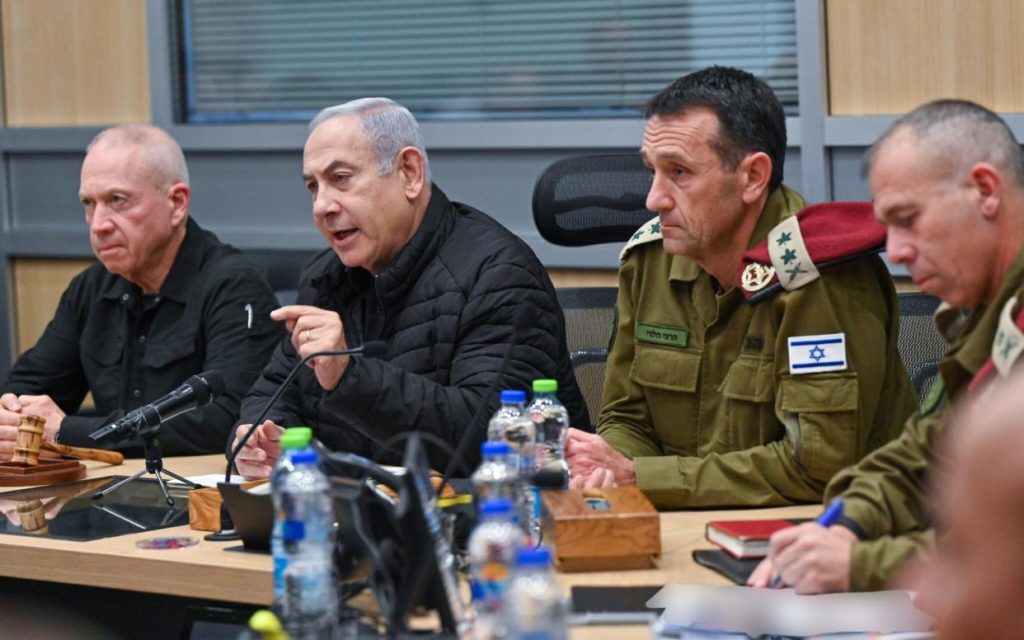According to analysts, the relatively modest scope of the Israeli attack, as well as the silence of the Iranian regime, may have reduced the chances of an escalation of the conflict

Israeli Prime Minister Benjamin Netanyahu with Defense Minister Yoav Gallant and IDF chief Herzi Halevi. Image Internet.
JERUSALEM (RN) — The relatively modest scope of Israel’s attacks on Thursday, as well as Iran’s tempered response, may have reduced the chances of an immediate escalation of fighting between the two Middle Eastern powers, according to several international analysts.
The fear circulating in recent days was that a forceful Israeli attack in response to Iran’s offensive on the south of the Hebrew state last weekend could have provoked an even more aggressive reaction from Tehran and turned a one-on-one war into a wider conflagration.
Foreign governments had advised Israel to view the success of its defenses against the deluge of Iranian missiles and drones as a victory that did not call for retaliation, and warned that a strong counterattack could further destabilize the region, after more than six months of war between the Israeli military and the Hamas terror group in Gaza.

Palestinian men cry as they see the impossibility of being able to exact revenge for the merciless bombardment of the Israeli army in the Gaza Strip Image Internet.
But when Israel’s attack finally occurred, it seemed less destructive than feared, allowing the regime and Iranian state media to downplay its relevance. No official in Tehran came out to publicly blame Israel, although privately several acknowledged that Benjamin Netanyahu’s government was behind it.
Iranian officials said they had not detected any enemy aircraft in Iranian airspace and that the main attack — on a military base in central Iran, in Isfahan — had been initiated by small drones that had likely been launched from inside Iranian territory. The nature of the attack was even unprecedented: early last year, Israel used a similar method against a military facility in Isfahan.
As early as dawn on Friday, Iranian state media was broadcasting a message of a swift return to normalcy, with images of the streets functioning as usual and interviews with officials publicly downplaying the impact of the attack. After a brief overnight closure, airports also reopened.
Analysts warn that, in any case, the outcome is still unpredictable and that anything can happen. But Tehran’s initial reaction suggests that President Ebrahim Raisi’s government does not intend to respond militarily anytime soon, despite its warnings in recent days that it would react forcefully and quickly to any Israeli aggression.

Israeli drones are playing a decisive role in calibrated air raids over Iranian territory. Image Internet
«The way they present it to their own people and the almost immediate reopening of the skies allows them to pretend to be disinterested and not respond,» said Sima Shine, a former head of investigations at Mossad, Israel’s foreign intelligence agency, and an expert on Iran issues. «However, we have made so many assessment errors that I am very hesitant to say so with any degree of certainty,» he adds.
In fact, it was an erroneous assessment that triggered the current round of violence: on April 1, Israel attacked the Iranian consulate compound in Damascus, Syria, killing seven Iranian officials, including three senior commanders of the Revolutionary Guards, the regime’s ideological army.
Israel staged similar attacks on Iranian interests in Syria and Iraq for years, and without Iran reacting directly. But the scale of the attack in Damascus appeared to overwhelm Tehran’s tolerance, and Raisi’s government warned that it would no longer accept Israeli attacks on Iranian interests anywhere in the region.
In the early hours of April 14, Iran launched more than 300 missiles and drones at Israel, an unprecedented attack that caused little damage but whose scale stunned Israelis.
Even if Iran does not respond in the same way to Israel’s attack early Friday, the regime could still react forcefully to future Israeli attacks on Iranian assets in Syria and other parts of the Middle East, Shine warns.
And that possibility became more pressing early Friday, when the Syrian regime of Bashar al-Assad came out to denounce that Israel had attacked its territory again, at about the same time as its attack on Iran was unfolding.
In line with its policy of not commenting on such attacks, the Israeli government did not claim responsibility for what happened. But if the attack harmed Iranian interests, and if Tehran attributes the attack to Tel Aviv, it remains to be seen what Tehran’s final response is, analysts warn.
«The question is whether they will maintain their red line,» Shine said. «But what exactly is the red line for them? Only high-ranking people? Are they just embassies? Or all Iranian targets in Syria?»
«Israel tried to calibrate between the need to respond and the desire not to enter into a cycle of action and counterreaction that would only escalate endlessly,» said Itamar Rabinovich, a former Israeli ambassador to Washington, who described the situation as a choreography, in which both sides show their intentions and next steps.
«There is great relief throughout the region at how limited the attack was,» said Saudi analyst Abdelrahman al-Rashed.